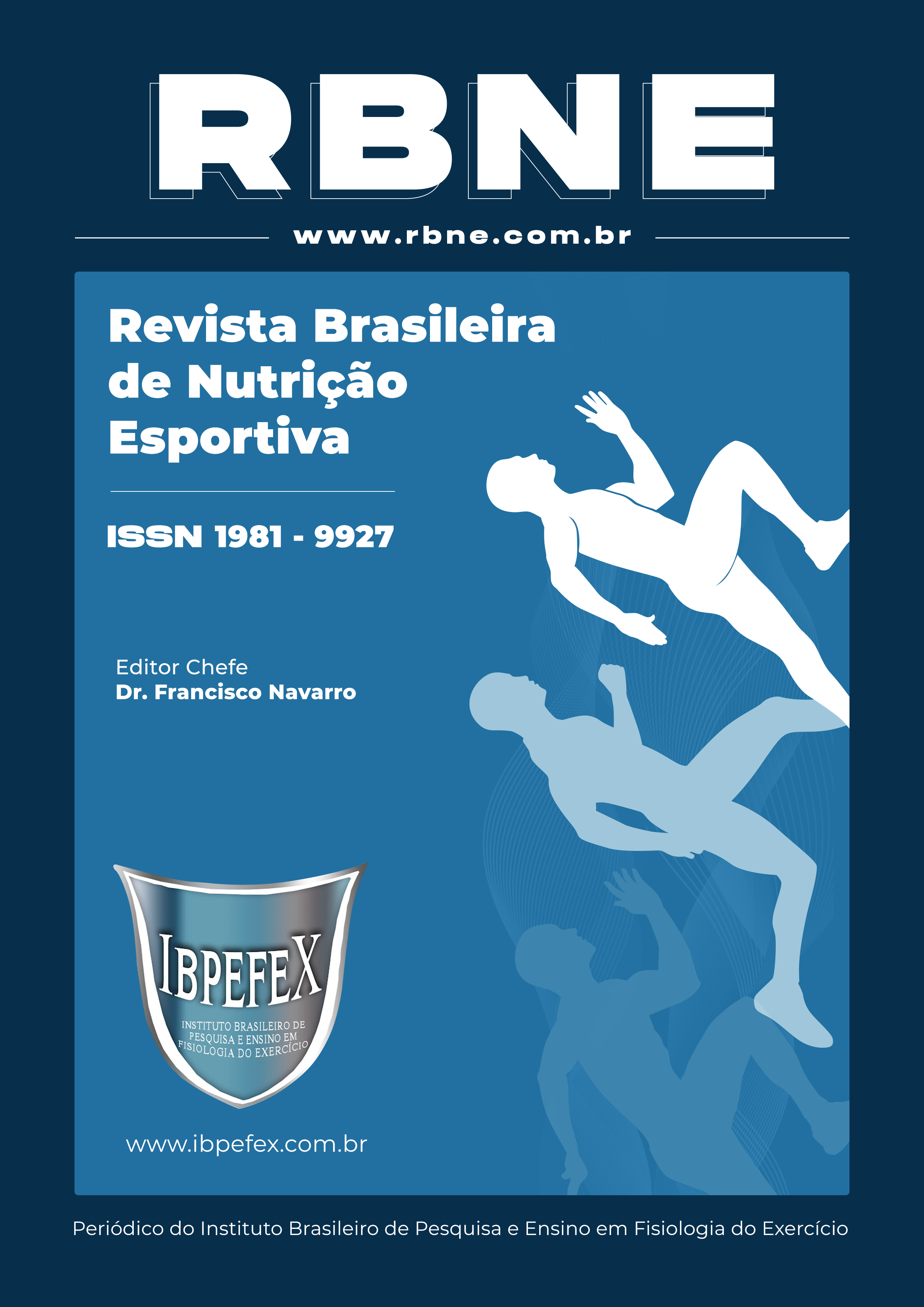Acute and chronic effects of NaHCO3 supplementation during exercise: a critical review
Abstract
One of the reasons for the generation of muscle fatigue in high-intensity physical training is associated with the decrease in pH and accumulation of H+, thus favoring the process of metabolic acidosis. Studies point to the possibility of using sodium bicarbonate (NaHCO3) as an ergogenic process in order to attenuate the effects of fatigue during training. Thus, the present study aimed to carry out a critical review of the literature in order to analyze the acute and chronic effects of NaHCO3 supplementation during exercise. The review in question was carried out through electronic research on academic websites, such as Google Scholar, Scielo, PubMed, RBNE, without date restriction. Scientific articles were analyzed with emphasis on human beings and terms such as: sodium bicarbonate; and exercises, articles in English and Portuguese were considered, articles that did not fit the specifications were discarded. It is concluded that NaHCO3 ingestion stimulated the bicarbonate buffering process by the alkalinization of the intracellular medium, thus stimulating changes in pH and in the transport of lactate/H+ from the intracellular to the extracellular medium. The effects of ingestion of NaHCO3 chronically and acutely showed an increase in performance in relation to placebo, however, studies were found that did not obtain changes in performance or significant values in relation to placebo.
References
-Calvo, J.L.; Xu, H.; Mon-López, D.; Pareja-Galeano, H.; Jiménez, S.L. Effect of sodium bicarbonate contribution on energy metabolism during exercise: a systematic review and meta-analysis. Journal of the International Society of Sports Nutrition. Vol. 18. Num. 1, 2021. p. 11.
-Casarin, C.A.S.; Battazza, R.A.; Lamolha, M.A.; Kalytczak, M.M.; Politti, F.; Evangelista, A.L.; Serra, A.J.; Rica, R.L.; Paunksnis, M.R.R.; Teixeira, C.V.; Junior, A.F.; Bocalini, D.S. Sodium Bicarbonate Supplementation Improves Performance In Isometric Fatigue Protocol. Revista Brasileira de Medicina do Esporte. Vol. 25. Num. 1. 2019. p. 40-44.
-Duncan, M.J.; Weldon, A.; Price, M.J. The effect of sodium bicarbonate ingestion on back squat and bench press exercise to failure. The Journal of Strength & Conditioning Research. Vol. 28. Num. 5. 2014. p. 1358-1366.
-Durkalec-Michalski, K.; Zawieja, E.E.; Podgórski, T.; Zawieja, B.E.; MichaIłowska, P.; Łoniewski, I.; Jeszka, J. The Effect of a New Sodium Bicarbonate Loading Regimen on Anaerobic Capacity and Wrestling Performance. Nutrients. Vol. 10. Num. 6. 2018a. p. 697.
-Durkalec-Michalski, K.; Zawieja, E.E.; Podgórski, T.; Łoniewski, I.; Zawieja, B.E.; Warzybok, M.; Jeszka, J. The effect of chronic progressive-dose sodium bicarbonate ingestion on CrossFit-like performance: A double-blind, randomized cross-over trial. PloS one. Vol. 13. Num. 5. 2018b. p. e0197480.
-Edge, J.; Bishop, D.; Goodman, C. Effects of chronic NaHCO3 ingestion during interval training on changes to muscle buffer capacity, metabolism, and short-term endurance performance. Journal of Applied physiology. Vol. 101. Num. 3. 2006. p. 918-925.
-Grgic, J.; Pedisic, Z.; Saunders, B.; Artioli, G.G.; Schoenfeld, B.J.; Mckenna, M.J.; Bishop, D.J.; Kreider, R.B.; Stout, J.R.; Kalman, D.S.; Arent, S.M.; Vandusseldorp, T.A.; Lopez, H.L.; Ziegenfuss, T.N.; Burke L.M.; Antonio, J.; Campbell, B. I. International Society of Sports Nutrition position stand: sodium bicarbonate and exercise performance. Journal of the International Society of Sports Nutrition. Vol. 18. Num. 1. 2021. p. 61.
-Krustrup, P.; Ermidis, G.; Mohr, M. Sodium bicarbonate intake improves high-intensity intermitente exercise performance in trained young men. Journal of the International Society of Sports Nutrition. Vol. 12. Num. 1. 2015. p. 25.
-Lehninger, T.M.; Nelson, D.L.; Cox, M.M. Princípios de Bioquímica. São Paulo. Artmed. 2014.
-McNaughton, L.R.; Gough, L.; Deb, S.; Bentley, D.; Sparks, S.A. Recent developments in the use of sodium bicarbonate as an ergogenic aid. Current sports medicine reports. Vol. 15. Num. 4. 2016. p. 233-244.
-Miller, P.; Robinson, A.L.; Sparks, S.A.; Bridge, C.A.; Bentley, D.J.; McNaughton, L.R. The Effects of Novel Ingestion of Sodium Bicarbonate on Repeated Sprint Ability. The Journal of Strength & Conditioning Research. Vol. 30. Num. 2. 2016. p. 561-568.
-Motta, E.S.; Souza, E.B. Suplementação de bicarbonato de sódio em praticantes de musculação. Revista Brasileira de Nutrição Esportiva. São Paulo. Vol. 12. Num. 74. 2018. p. 812-818.
-Oliveira, L.F.; Salles V.P.; Nemezio, K.; Gonçalves, L.S.; Yamaguchi, G.; Saunders, B.; Gualano, B.; Artioli, G.G. Chronic lactate supplementation does not improve blood buffering capacity and repeated high‐intensity exercise. Scandinavian journal of medicine & science in sports. Vol. 27. Num. 11. 2017. p. 1231-1239.
-Siegler, J.C.; Mudie, K.; Marshall, P. The influence of sodium bicarbonate on maximal force and rates of force development in the triceps surae and brachii during fatiguing exercise. Experimental Physiology. Vol. 101. Num. 11. 2016. p. 1383-1391.
-Tobias, G.; Bematti, F.B.; Salles, V.P.; Roschel, H.; Gualano, B.; Sale. C.; Harris, R.C.; Lancha Junior, A.H.; Artioli, G.G. Additive effects of beta-alanine and sodium bicarbonate on upper-body intermittent performance. Amino acids. Vol. 45 Num. 2. 2013. p. 309-317.
-Toledo, L.P.; Vieira, J.G.; Dias, M.R. Acute effect of sodium bicarbonate supplementation on the performance during CrossFit® training. Motriz: Revista de Educação Física. Vol. 26. 2020.
Copyright (c) 2023 Alaor Cristian Rodrigues, Wanderson Matheus Lopes Machado, Claudia Eliza Patrocínio Oliveira, Osvaldo Costa Moreira

This work is licensed under a Creative Commons Attribution-NonCommercial 4.0 International License.
Authors who publish in this journal agree to the following terms:
- Authors retain the copyright and grant the journal the right of first publication, with work simultaneously licensed under the Creative Commons Attribution License BY-NC which allows the sharing of the work with acknowledgment of the authorship of the work and initial publication in this journal.
- Authors are authorized to enter into additional contracts separately for non-exclusive distribution of the version of the work published in this journal (eg, publishing in institutional repository or book chapter), with acknowledgment of authorship and initial publication in this journal.
- Authors are allowed and encouraged to post and distribute their work online (eg, in institutional repositories or on their personal page) at any point before or during the editorial process, as this can bring about productive change as well as increase impact and impact. citation of published work (See The Effect of Free Access).






